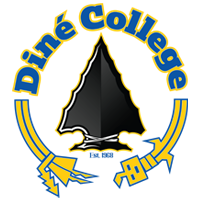NEWS RELEASE
Office of Public Relations
Diné College • Tsaile, AZ • 86556 • (928) 724-6697
bdotson@dinecollege.edu
CONTACT: Bernie Dotson
FOR IMMEDIATE RELEASE
June 11, 2018
From Chinle High to the University of Washington
Katrina Claw, Ph.D., talks Genomics, Higher Ed
TSAILE, Ariz. — On many school nights while a college student, after working shifts at a department store, Katrina Claw studied long and hard.
The Many Farms, Ariz., native graduated salutatorian of Chinle High School in 2001. Claw, Ph.D., is now a post-doctoral research fellow at the University of Washington in Seattle in the Department of Pharmaceutics, having received a doctoral degree from UW in 2013.
Claw spoke June 11 at Diné College as part of the College’s 2018 Speaker Series. The series highlights past and present people who have direct connections with Diné College.
“I hope from giving this presentation that I give you more motivation for learning,” Claw told the 60-plus mostly students and staffers attending the two-hour talk. Claw’s presentation was entitled, “Taking the Educational Ladder: From the Reservation to a Ph.D., and Beyond.”
Claw said, “There have been a lot of challenges that I have had to face over the years.”
Claw is an alumnae of Diné College’s Summer Research Enhancement Program which is overseen by science professor Mark Bauer, Ph.D. She is a biology and anthropology graduate of Arizona State University.
SREP is an annual program at Diné College, which utilizes classroom and experiential curricula designed to introduce predominantly Navajo undergraduates and paraprofessionals to health research. SREP influenced Claw’s decision to study science. She said after the talk that as a young student with Diné College’s SREP, she learned new aspects of science and valued the one-on-one approach with Bauer — who has overseen SREP for almost 20 years. “It’s funny how (Bauer) and I started out and now we’re colleagues.”
Claw said she started out at ASU as an engineering major, but later changed to the more research-oriented field of genome sciences.
“My brother and I were engineering majors and lived together while students at one point,” Claw said.
Claw’s talk centered upon how she chose her undergraduate and graduate majors and the road blocks she encountered along the way. “I wanted to do something that would impact my community,” Claw said of her career path.
Claw said emotional distress, financial uncertainties and language and cultural traditions are par the course for Navajos navigating the world of higher education at big universities. She said she got her share of rejection letters for programs she sought while going through graduate school.
“Don’t settle for the dirty jobs,” she said her father used to tell her.
As a post-doctoral Navajo researcher at the University of Washington, Claw’s interests include human genetics and genomics, pharmacogenomics, and the ethical, social and legal implications of genomic research with American Indian/Alaska Native and other indigenous populations around the world.
Claws aid she’d like to have an impact on the number of indigenous people pursuing science as a career. She said she and Bauer correspond on various subjects.
“We need mentors to who can provide support and guide us through the system, and help us find funding.” she said.
Miranda Haskie, a sociology professor at Diné College and an organizer of the Speaker Series, lauded Claw’s engagement with Native populations with respect to genomic medicine research.
“I think we all learned a lot about genetics and genomics,” Haskie said.
